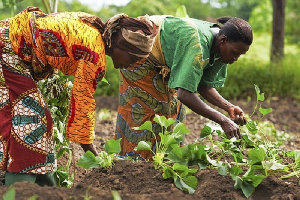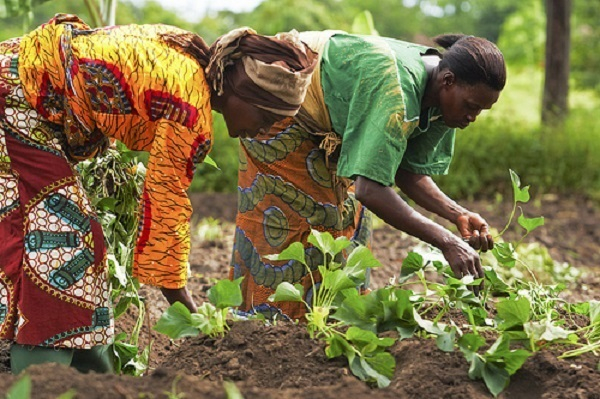 File photo of women in agriculture
File photo of women in agriculture
Stakeholders in the agricultural sector have appealed to government to invest and mainstream agroecology into national and sub-national agricultural development strategies to promote sustainable food production and environmental protection in Ghana.
The appeal was made in a communiqué issued at the end of a two-day engagement held in Bolgatanga in Upper East Region.
The engagement formed part of the Agroecological Solutions for Resilient Farming in West Africa (CIRAWA) project, an EU-funded initiative being implemented in Ghana, Cape Verde, Senegal, and The Gambia to promote sustainable agricultural systems.
The CIRAWA project aims to build resilient farming systems through agroecology by combining indigenous knowledge and scientific innovation to ensure food security, enhance biodiversity, and combat climate change impacts in West Africa.
In Ghana, the project is being implemented in the Nabdam District in the Upper East Region and Central Gonja District in the Savannah Region.
The stakeholders at the engagement included the University for Development Studies (UDS) CIRAWA team, Regional Directors of Agriculture for the Savannah and Upper East Regions, District Directors of Agriculture from Central Gonja and Nabdam Districts, and agricultural extension personnel.
The stakeholders observed that about 80 to 90 per cent of food produced and consumed in northern Ghana came from smallholder farmers who already relied largely on agroecological practices, yet there was no national policy framework or dedicated government support to promote agroecology.
Professor Saa Dittoh, the Lead Investigator of the CIRAWA-Ghana, who presented the communique on behalf of the stakeholders, urged government to take bold steps to support agroecology, describing it as a proven pathway for resilient and climate-friendly agriculture.
“There should be strong governmental support and investments towards mainstreaming agroecology into national and sub-national agricultural development strategies. Agroecology should feature prominently in the Feed Ghana programme,” he said.
Professor Dittoh further recommended that Ghana developed a National Agroecology Strategy (NAS), and urged the various Metropolitan, Municipal and District Assemblies (MMDAs) to integrate agroecology promotion into their medium-term development plans.
He said: “Agroecology integrates farmers’ indigenous knowledge with responsible scientific knowledge to ensure sustainable production of wholesome, nutritious, and safe food while mitigating the negative effects of climate change and environmental degradation.”
Professor Dittoh argued that the prevailing conventional agricultural system, heavily supported by government and some development partners, had been detrimental to planetary, animal and human health due to its overreliance on agrochemicals, mono-cropping, and unsustainable mechanisation practices.
“The alternative to the challenges farmers face is not conventional agriculture,” he said, explaining that the current system worsened food and nutrition insecurity, increased poverty, and contributed to environmental degradation.
“We need to build capacity of agricultural extension officers to retool them with knowledge on agroecological practices,” he added.
He underscored the need to promote local production of farm inputs such as soil amendments, indigenous seeds, bio-fertilizers and bio-pesticides through collaborative research between scientists, farmers, and local knowledge bearers.
Professor Dittoh urged government to support innovation in the production of simple mechanised tools to reduce the drudgery associated with smallholder farming, and to strengthen farmer-based organisations through targeted training and funding.
He further called for a ban on the importation and production of dangerous agrochemicals, as well as stronger collaboration among researchers, extension personnel and farmers to scale up agroecological practices across the country.
Professor Dittoh also called on the MMDAs to be proactive in enacting and enforcing by-laws on animal ranching, transhumance, bush burning and illegal small-scale mining (galamsey) to protect the environment and secure livelihoods.
Dr Dzigbodi Adzo Doke, Co-Investigator, CIRAWA-UDS, said agroecology employed indigenous knowledge and seeds, which was easy to adopt, and it was climate resilient and urged for increased efforts to ensure sustainable food production.
Alhaji Zakaria Fusains, the Upper East Regional Director of the Department of Agriculture, agreed that agroecology was the great potential to ensuring food security and called for increased sensitisation for adoption.
Alhaji Seidu Sulemana, the Savannah Regional Director of the Department of Agriculture, said the agroecology was not only climate resilient but also environmentally friendly and called for more investment to empower more farmers with the knowledge to practice.
